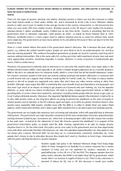Essay
Poverty and inequality essay 25 marker
- Institution
- AQA
This is a 25 marker essay: Evaluate whether the UK government should attempt to eliminate poverty, and child poverty in particular, or leave the issue to market forces. This essay evaluates the argument for and against to eliminate poverty and has very good relevant and in date application of econo...
[Show more]




